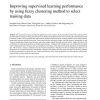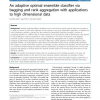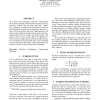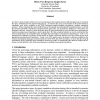266 search results - page 4 / 54 » Is Combining Classifiers Better than Selecting the Best One |
JIFS
2008
13 years 7 months ago
2008
The crucial issue in many classification applications is how to achieve the best possible classifier with a limited number of labeled data for training. Training data selection is ...
BMCBI
2010
13 years 7 months ago
2010
Background: Generally speaking, different classifiers tend to work well for certain types of data and conversely, it is usually not known a priori which algorithm will be optimal ...
ISMIR
2005
Springer
14 years 13 days ago
2005
Springer
At its heart, music information retrieval is characterized by the need to find the similarity between pieces of music. However, “similar” does not mean “the same”. Theref...
RIAO
2007
13 years 8 months ago
2007
In order to search corpora written in two or more languages, the simplest and most efficient approach is to translate the query submitted into the required language(s). To achieve...
ICML
2006
IEEE
14 years 7 months ago
2006
IEEE
Many of today's best classification results are obtained by combining the responses of a set of base classifiers to produce an answer for the query. This paper explores a nov...




